 Dina's School Site
Dina's School Site 
Dina L. Grayson
SoLS Graduate Program, LSE 229
Arizona State University
Tempe, Arizona 85287-4601
Lab: (480) 736-2689
Email: beegirl1@asu.edu
 Dina's School Site
Dina's School Site 
Dina L. Grayson
SoLS Graduate Program, LSE 229
Arizona State University
Tempe, Arizona 85287-4601
Lab: (480) 736-2689
Email: beegirl1@asu.edu
UNDER CONSTRUCTION
A Bee Hive
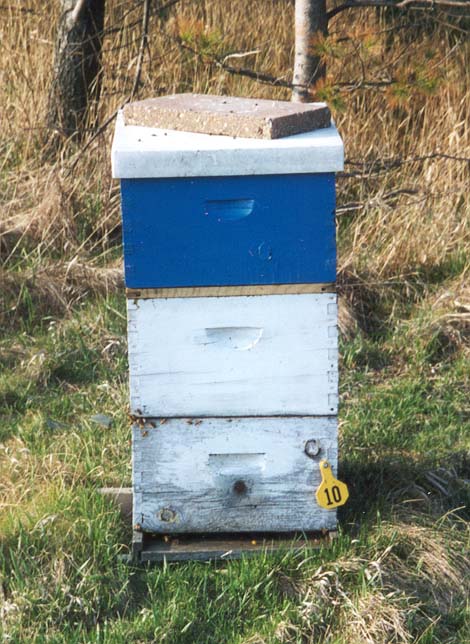
This is how bees are normally kept. This
particular
hive consists of 3 boxes, called supers, on top of each other.
Each
super contains 10 frames which the bees fill with honey, pollen
and brood. A normal colony consists of roughly 20,000 bees.
Observation Hive
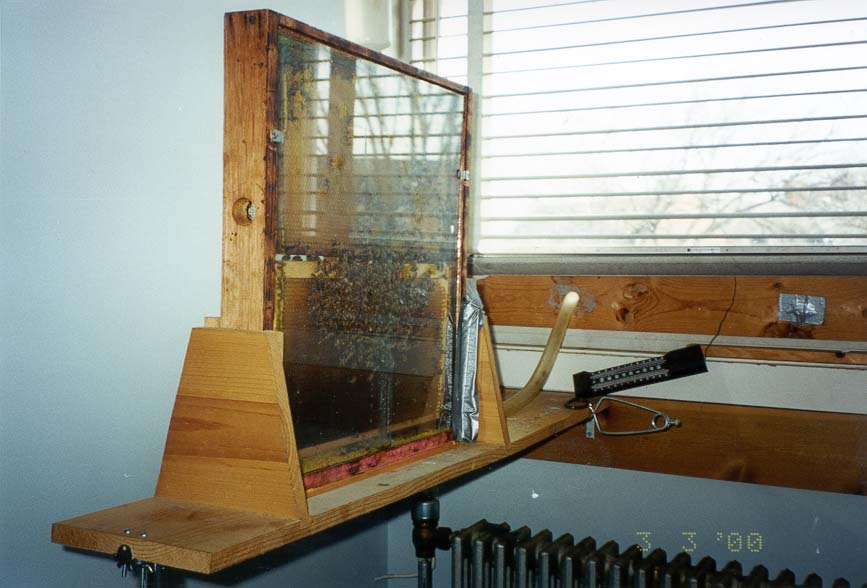
This is one of the methods used to observe
bees inside the hive. It is basically a small hive with glass
wallls. The bees can go outside to forage through the tube that
leads
to the window.
Queen Bee
In the middle of this photo is a queen bee. You
can distinguish her from the other bees due to her long abdomen.
The queen's main function in the hive is to lay eggs. Despite her
name, she does not dictate the colony's actions
Tagged Bee
In the middle of this photo is a bee with a yellow
plastic
tag on her thorax. In order to identify individual bees we often
glue these colored and numbered tags to them. In this photo and
the one below you can also see bees that have dabs of different paint
colors on their bodies. This is another method used to
distinguish
bees from each other. The white things in the background of this
photo are larvae.
Painted Bees
This is the photo from which the close-up above was
taken.
Bees on an Artificial Feeder
For many experiments bees are trained to an artificial
feeder like the one pictured above. The solution in the container
is sugar water that the bees suck up using their long tongues
(proboscis).
Bees on Honey Comb
This is a picture of some bees on a comb of honey that
has been capped over. Bees store honey in wax cells. When a
cell is full of honey they put a wax cap on it. That is the
yellow
that you see in the background of this picture. This picture also
shows the nice hexagonal shape that wax cells typically have.
Backlit Bees
Bumblebee Flight Cage
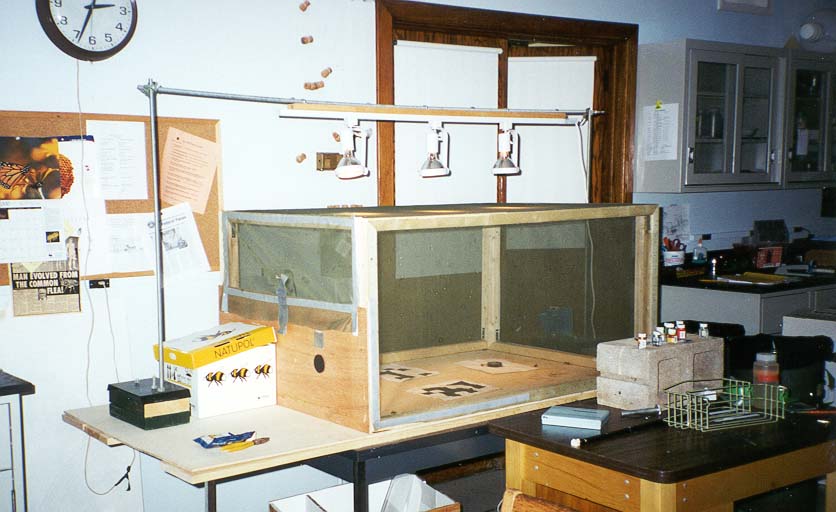
This is a bumblebee colony with an atached flight
cage. The box with
a yellow cap on it is the colony's hive. The wooden structure
covered
with green mesh is a flight cage that the bees were allowed to fly
around
in. Above the flight cage are lights.
Bumblebee Colony
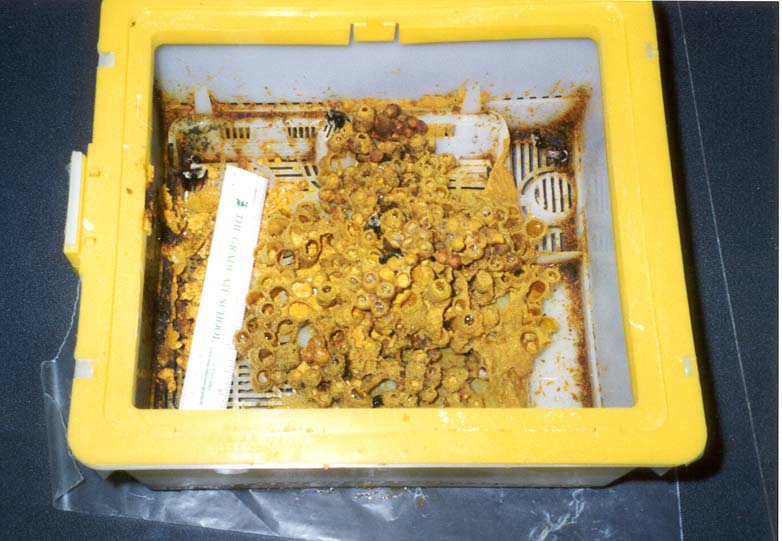
This is a picture of inside the bumblebee hive.
You can see fairly clearly the honey and pollen storage pots.
They
aren't neatly hexagonal like the cells of a honeybee colony.
Bumblebee Colony Close-up
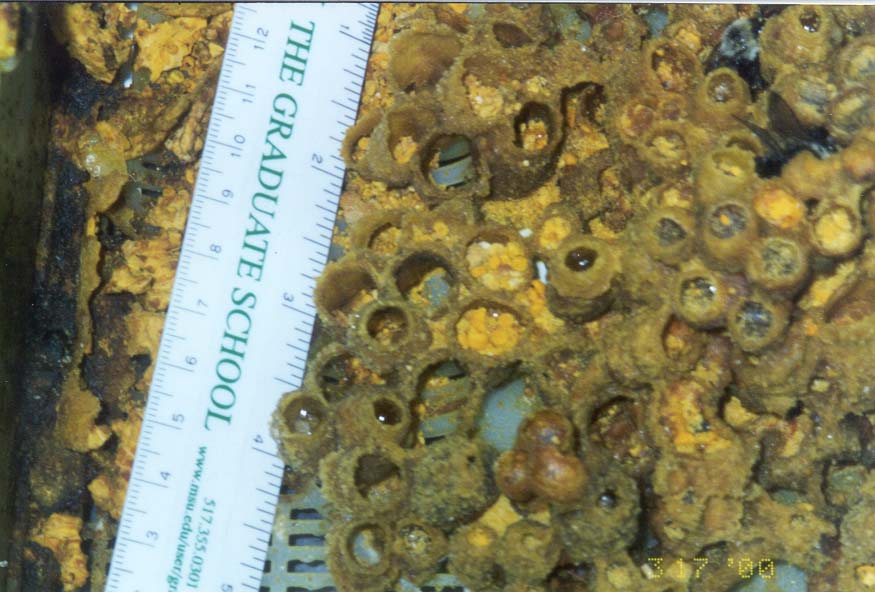
Here is a better picture of the bumblebee storage pots
with a ruler for reference.
Comparisons of a Honeybee and a Bumblebee
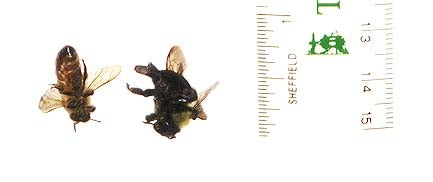
Bottoms up

Top View
All of these photos were taken by Dina L. Grayson
Bee Related Sites
Honeybee
Biology
Honeybee Australis
Honeybee Course
Home Page
The Internet Apiculture
and Beekeeping Archive
Bee Improvement and
Bee Breeder's Association - BIBBA
The Amazing
BeeCam
BeeChat
The Bumblebee
Pages
CyberBeeNet (Biology, Research,
Beekeeping)
Bees and Honey
Revised January 29, 2004